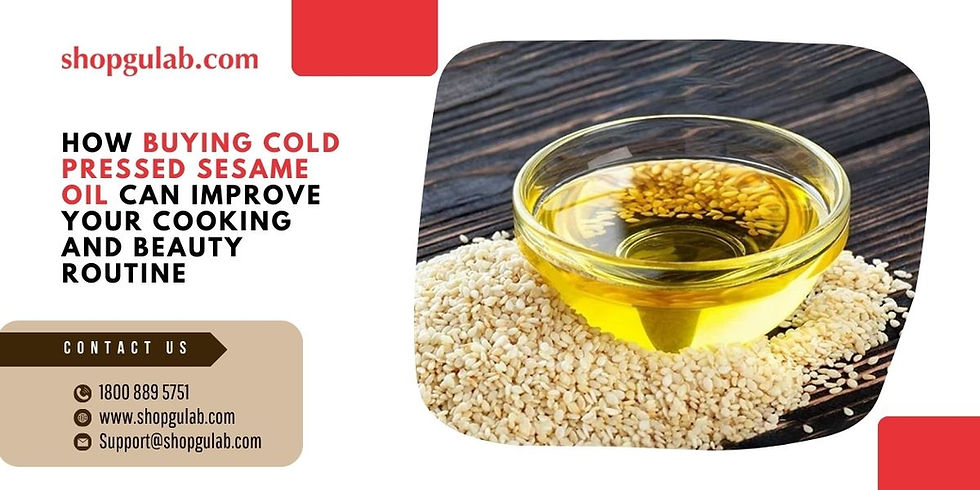Cooks' Companion: Embracing Extra Virgin Coconut Oil for Healthy Eating
- Nov 16, 2023
- 3 min read
Introduction
Cooking oils have been a pivotal part of cuisines worldwide for centuries. Among the diverse options available, extra virgin coconut oil eating that stands out for its myriad health benefits and versatile uses.
Understanding Extra Virgin Coconut Oil
Extra virgin coconut oil is derived from the meat of fresh coconuts through a cold-pressed extraction method, preserving its natural goodness. Unlike refined coconut oil, this variant retains a rich aroma and taste of coconut.
Nutritional Benefits of Extra Virgin Coconut Oil
It contains medium-chain fatty acids (MCFAs), notably lauric acid, recognized for its antibacterial and antiviral properties. MCFAs are easily digested and converted into energy, aiding in weight management and promoting heart health.
Cooking with Extra Virgin Coconut Oil
Its high smoke point makes it suitable for various cooking techniques, from sautéing to baking, imparting a subtle nutty flavor to dishes. Its stability under heat preserves nutrients, making it a healthier alternative.

Health Benefits of Incorporating Extra Virgin Coconut Oil
Studies suggest that its consumption may boost brain function, improve cholesterol levels, and support immune health. Its anti-inflammatory properties make it a valuable addition to one's diet.
Using Extra Virgin Coconut Oil in Beauty Routines
Beyond the kitchen, this oil serves as a natural moisturizer, hair conditioner, and makeup remover. Its hydrating and antibacterial properties make it a go-to option in skincare regimes.
Choosing the Right Extra Virgin Coconut Oil
Opt for organic, unrefined, cold-pressed varieties to ensure maximum nutrients and purity. Look for certifications to validate authenticity and quality.
Myths and Misconceptions
Addressing common misconceptions surrounding saturated fats and cholesterol levels associated with coconut oil consumption to provide clarity.
Tips for Storing Extra Virgin Coconut Oil
Preserve its freshness by storing it in a cool, dark place away from direct sunlight. Avoid exposure to air and moisture to prevent rancidity.
Recipes with Extra Virgin Coconut Oil
Explore innovative recipes ranging from savory stir-fries to indulgent desserts that harness the unique flavors of extra virgin coconut oil.
Health Benefits of Extra Virgin Coconut Oil
Cardiovascular Health
Research suggests that the lauric acid in extra virgin coconut oil may help raise HDL (good) cholesterol levels while maintaining a healthy balance of LDL (bad) cholesterol, thereby supporting heart health. Its antioxidant properties also contribute to reducing oxidative stress.
Blood Sugar Regulation
The medium-chain triglycerides (MCTs) in extra virgin coconut oil may aid in improving insulin sensitivity, potentially assisting in managing blood sugar levels. However, individuals with diabetes should consult healthcare professionals before incorporating it into their diets.
Anti-Inflammatory Properties
The presence of antioxidants like polyphenols and vitamins E and K in extra virgin coconut oil contributes to its anti-inflammatory effects, which can benefit conditions like arthritis and inflammatory skin disorders.
Digestive Health
The antimicrobial properties of lauric acid may aid in fighting harmful bacteria, viruses, and fungi in the gut, promoting a healthy digestive system.
Using Extra Virgin Coconut Oil in Cooking
Enhancing Flavor and Texture
Its unique taste and aroma make it an excellent addition to both sweet and savory dishes, elevating their flavors. When used in baking, it can impart a moist texture to cakes and cookies.
Substituting Other Cooking Oils
Due to its stability at high temperatures, extra virgin coconut oil can replace other less heat-stable oils in recipes, offering a healthier alternative without compromising taste.
Healthier Frying Option
When used for frying, its high smoke point reduces the formation of harmful compounds, making it a preferable option compared to some other oils.
Sustainability and Ethical Considerations
Environmental Impact
The cultivation of coconuts for oil production tends to have a lower environmental impact compared to some other oil sources. Additionally, coconut trees require fewer pesticides and synthetic fertilizers.
Fair Trade and Ethical Sourcing
Opt for brands that prioritize fair trade practices, ensuring fair wages and working conditions for coconut farmers and laborers involved in the production process.

Conclusion
Incorporating extra virgin coconut oil into your lifestyle offers a multitude of benefits, from supporting overall health to enhancing culinary experiences. Its versatility in both cooking and personal care routines makes it a valuable asset in fostering a holistic approach to well-being.
Shop now and discover the latest trends in products!








Comments